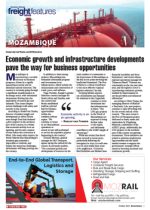Agriculture and minerals are two sectors in Mozambique that require careful attention and offer significant opportunities for the logistics industry. According to Dário Viegas, the managing director of Mozrail e Terminais, Lda, with appropriate policies and active involvement, these sectors have the potential to support sustainable development initiatives, boost import and export volumes and rejuvenate the economy in the medium to long term.Speaking to Freight News, he said the country was seeing year-on-year growth. Expected investment in the LNG projects only improved the overall outlook for the country. “The gas projects will contribute to State income and allow the government to drive other projects that will in turn allow for consistent growth over the years.”According to Viegas, although there has been some progress in agriculture over the years, the lack of investor confidence and concerns related to landowner rights still hinder its growth.However, Mozambique holds the potential to become a major player in the agricultural sector in the long run, thanks to its abundant fertile soils and untapped regions. “As for mining, it is on the rise, but there is a need for better regulation and management of informal mining operations. Mineral exploration in Mozambique has been limited, with the exception of the Moatize Coal project, graphite projects and ruby projects. This situation presents a substantial opportunity for year-round volumes and growth in the mineral sector,” he said.Viegas added that the potential of Mozambique could not be overstated. “The country serves as a crucial gateway to the hinterland, and there has been a notable diversification in the choice of ports for this purpose. We are observing that the Maputo port has emerged as a viable alternative to the conventional ports, particularly for countries like Zimbabwe and Botswana. This shift is driven by the steady movement of commodities and a noticeable increase in cargo volumes.”He said port statistics clearly showed that volumes were growing on a year-on-year basis. Cargo was also becoming more diversified.“However, good policy for investments is needed for the sustained growth in volumes and avoidance of external impacts that may hinder the production and volumes handled,” he said. “One of the biggest challenges, however, is still the lack of integration with infrastructure networks with other countries. Rail is not seamless, which creates delays and has more hassle in management. By implementing corridor strategies and fostering private sector participation, the logistics corridors served by Mozambique ports have a significant advantage for cargoes that need to go to Middle East and Far East destinations considering its geographical position.”He said Mozambican corridors had the potential to offer highly competitive alternatives to the traditional solutions currently in use. With the right policies in place, these corridors could indeed become a regional game-changer in the logistics sector."We promote regional integration and enhance it through our multimodal facility in Maputo, offering an integrated end-to-end and cost-effective logistics solution that utilises the Port of Maputo as a gateway to the hinterland countries of Zimbabwe, Botswana, Zambia, Eswatini, and the southeast region of South Africa.Our services enable shippers, agents and consignees to conduct logistics operations outside the port within a customs-controlled environment. This provides a substantial advantage, leading to reduced storage and handling costs, ultimately supporting their supply chain in today's cost-sensitive world.

